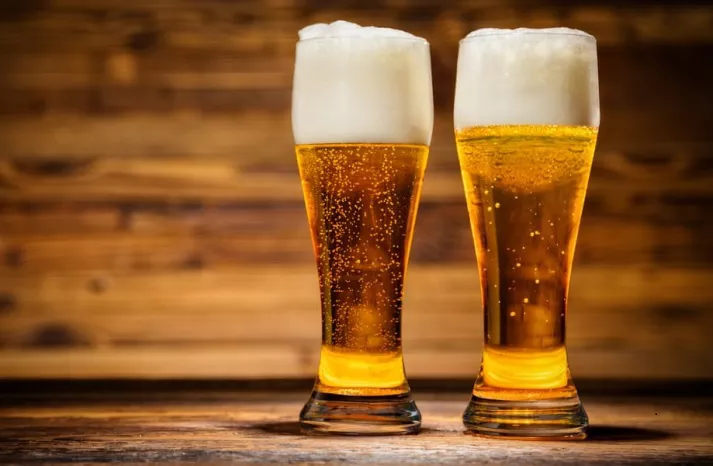For centuries, beer has been a popular beverage enjoyed by people around the world. However, for some individuals, the experience of drinking beer comes with an unwelcome side effect: gas. The question that often arises is, “Why does beer cause gas?” In this article, we will delve into the scientific factors behind this phenomenon and explore various aspects contributing to the formation of gas during beer consumption.
**1. The Brewing Process and Carbonation: Unraveling the Mystery
The journey from grain to glass involves a complex brewing process that introduces carbonation into beer. This carbonation, often in the form of carbon dioxide, plays a crucial role in creating the effervescence that beer enthusiasts appreciate. As beer undergoes fermentation, yeast consumes sugars, producing alcohol and carbon dioxide. When this carbon dioxide is not fully released during brewing or if additional carbonation is introduced, it can contribute to the gaseous nature of beer.
**2. Beer Ingredients: Fermentable Sugars and Their Impact on Gas
One key element in the beer-making process is the use of fermentable sugars. These sugars serve as the fuel for yeast during fermentation. However, when certain sugars are not fully fermented, they can remain in the beer and become fermentable by bacteria in the digestive system. As a result, undigested sugars can lead to increased gas production in the gastrointestinal tract. Understanding the interaction between beer ingredients and the digestive system sheds light on why some individuals may experience gas after consumption.
**3. The Role of Yeast: Brewing Partners and Gas Producers
Yeast is a microscopic organism crucial to the beer-making process. It transforms sugars into alcohol and carbon dioxide, contributing to the beer’s flavor and effervescence. However, when yeast is not entirely removed or deactivated during brewing, it can continue to ferment residual sugars in the beer, both in the brewing vessel and in the gastrointestinal tract. This ongoing fermentation in the digestive system can result in the release of gases, providing a direct link to the question of why beer causes gas.
**4. Barley and Gluten: Potential Culprits in Gastrointestinal Discomfort
Barley, a common ingredient in beer, contains gluten – a protein composite that can be challenging for some individuals to digest. For those with gluten sensitivity or celiac disease, the consumption of beer may lead to gastrointestinal discomfort, including bloating and gas. Understanding the relationship between barley, gluten, and digestive issues helps unravel the complexities of why beer can cause gas in certain populations.
**5. Carbonation and Gastric Distress: A Delicate Balance
The carbonation level in beer, achieved through various brewing techniques, is a defining characteristic of different beer styles. While carbonation contributes to the beverage’s mouthfeel and aroma, excessive carbonation can lead to gastric distress. Overly effervescent beers may cause increased belching and flatulence as the excess gas is released in the digestive system. Striking a balance between an appealing level of carbonation and digestive comfort is essential in understanding the dynamics of why beer causes gas.
See Also: non-grain vodka
**6. Individual Variability: Not All Guts Are Created Equal
One must consider the individual differences in the gastrointestinal tract when exploring why beer causes gas. Each person’s digestive system is unique, with variations in the composition of gut bacteria and enzymes. Some individuals may possess a higher tolerance for certain sugars and compounds found in beer, while others may be more prone to experiencing gas-related discomfort. Recognizing the role of individual variability is crucial in understanding the diverse responses to beer consumption.
**7. Alcohol and Its Impact on Digestion: Beyond the Bubbles
While carbonation and sugars contribute significantly to the gas-producing potential of beer, alcohol itself can also influence digestion. Alcohol can stimulate gastric acid production and affect the muscle contractions in the digestive tract, potentially leading to an increase in gas production. Examining the multifaceted impact of alcohol on digestion provides a comprehensive perspective on why beer-induced gas may be a result of various interacting factors.
**8. Tips for Minimizing Gas: Enjoying Beer Without the Discomfort
For those who appreciate the taste of beer but wish to minimize the associated gas, several strategies can be employed. Opting for beers with lower carbonation levels, choosing gluten-free or low-gluten options, and being mindful of individual tolerance to specific ingredients are practical approaches. Additionally, moderating alcohol intake and enjoying beer in moderation can contribute to a more comfortable drinking experience.
**9. The Impact of Beer Temperature: A Factor in Gas Formation
The temperature at which beer is consumed can also influence its impact on the digestive system. Cold beverages may slow down digestive processes, potentially leading to increased gas retention. Conversely, warmer temperatures can enhance digestion, reducing the likelihood of excessive gas buildup. Understanding the role of temperature in the context of beer consumption adds another layer to the complex question of why beer causes gas.
**10. Conclusion: Navigating the Bubbling World of Beer and Gas
In conclusion, the formation of gas during beer consumption is a multifaceted phenomenon influenced by various factors, including the brewing process, ingredients, yeast activity, gluten content, carbonation levels, and individual differences in digestive systems. By unraveling the complexities behind why beer causes gas, individuals can make informed choices to enhance their enjoyment of beer while minimizing any associated discomfort. Whether it’s choosing a beer with lower carbonation, opting for gluten-free alternatives, or moderating alcohol intake, understanding the science behind beer and gas allows enthusiasts to savor their favorite beverage with greater satisfaction.


